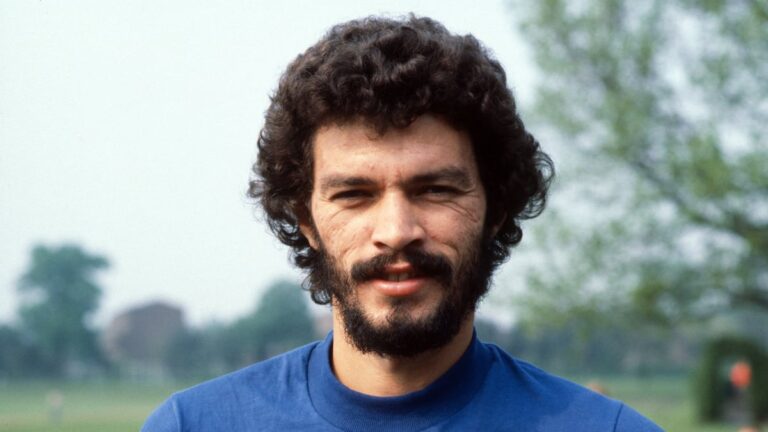Forty years ago, in April 1984, the streets of Brazil were crying for freedom. The dictatorship was on the verge of death. The military government had promised a slow, gradual and safe opening to democracy, but the people were in a hurry. The people wanted a direct election for the president and launched a massive protest movement called the Diretas Ja Campaign, giving Socrates, one of the most unique soccer players in Brazil’s history, the greatest political moment of his life. Ta. His father, a civil servant and avid reader of Greek philosophy, chose this name. However, to avoid suspicion, he added his middle name before his two compound surnames, which are common in Brazil. Socrates Brasileiro Sampaio de Souza Vieira de Oliveira (1954-2011) became a genius athlete, charismatic and politically involved like few other athletes at the time and since. As of 2022, along with the Ballon d’Or, the highest individual honor in the sports world, the Socrates Award, which honors achievements of social significance, is awarded to athletes.
His training as a doctor earned him the nickname “Doutor Socrates.” Although he has never won a World Cup, few doubt his inclusion in Canarinha’s ideal XI. The star Corinthians midfielder co-founded a team management experiment called Democrasia Corinthiana in the 1980s and acquired a progressive political consciousness that led him to the forefront of the democratic struggle in the final stages of the dictatorship. front. On April 16, 1984, he and several of his Corinthians teammates were one of the protagonists of the largest Diretas Jah Rally. Among the politicians who took part was Luiz Inácio Lula da Silva, who is currently in his third term and just beginning to emerge. The Brazilian president, a Corinthians fan, often talks about his beloved team.
On that day, large-scale protests were held in São Paulo, the largest of the campaign, calling on the generals to directly elect the country’s first post-military president. Demonstrations had already been held in cities such as Rio de Janeiro and Belo Horizonte.
As the gathering heated up, Socrates, a leftist, made a promise on the podium. He was wearing a yellow T-shirt, a color that at the time symbolized democracy, not Bolsonism as it does today. He declared that he would reject offers to appear if a parliamentary amendment allowing direct election of the president was passed. In Italy. He vowed to stay home to participate in the transition as another citizen. “I think he made the decision on the spot because he saw how excited everyone was at the rally,” said journalist Andrew Downey. Dr. Socrates: Soccer Player, Philosopher, Legendhe explains over the phone from Edinburgh. “He was one of the few players who prioritized cause and life over money. He was willing to give up millions of dollars to play in Italy to participate in the transition to democracy.”
Socrates was a technically excellent player and had a magical backheel touch. One of his brothers was named Sophocles and another named Sosthenes. His participation in the 1982 World Cup in Spain went down in history. On the other hand, his height was 1.92 meters and his feet were small, size 8. His physique wasn’t the only thing that was unique about him. “His father read Plato, and the name he gave him shows how much he valued education,” says Downey, who was a correspondent in Brazil.
Socrates made his professional debut without abandoning his medical studies, which he completed a few years later. And he always liked parties. He frequented bars and nightclubs. He combined his football career with smoking and liters of beer. He died at the age of 57 due to liver cirrhosis.
He loved soccer for fun and considered it work. Because his vision extended far beyond the ball. It is often said that witnessing his father burn banned books when he was 10 years old during the coup in 1964 left a deep impression on him. It sowed the seeds of a democratic movement in Socrates. The youngest of the family, Rai, followed in his footsteps as a professional footballer.
A few days after the diretas ya meeting in São Paulo, Socrates gave a wide-ranging interview in which he said: Whether you work as a footballer, a cleaner, a plumber or a doctor is another story,” he told sports magazine journalist Juka Kufouri. placar.
Democracia Corinciana was an experiment in collective management carried out by the club between 1982 and 1984, when Brazil was still under dictatorship. The promoters included Socrates, Vladimir, Casagrande, and several other team members. Players, coaches, and all employees agreed to make internal decisions by voting, with everyone’s vote counted equally. No other major club has ever conducted an experiment like this, and it resulted in wins on the field.
The Brazilian people’s aspirations for democracy were suppressed in Congress. The amendment regarding direct elections failed, so Socrates ended up playing for Fiorentina in Europe. He once said he wanted to play in Italy so he could read Antonio Gramsci in Italian. After he spent one season in Serie A, he returned to Brazil. Downey contends that personal factors also played a role in his impromptu promise. “Socrates was having an affair with a singer, and he knew that if he went to Italy he would be with her. And if he stayed, her marriage would be saved.”
After his retirement, Socrates coached, co-authored books, appeared in soap operas, produced plays, and recorded albums until his untimely death. He has left a deep mark on Brazil, where 1,899 people are named after him, most of whom were born in his most glorious period, his 1980s. Following in the footsteps of his father, the youngest of his six descendants was named Fidel Castro, albeit in a completely different capacity.
Apply our weekly newsletter Get more news coverage in English from EL PAÍS USA Edition

